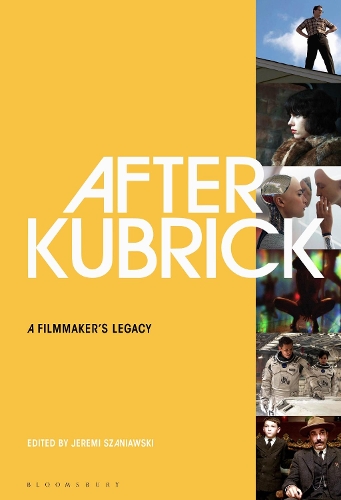
After Kubrick: A Filmmakers Legacy
(Hardback)
Available Formats
Publishing Details
After Kubrick: A Filmmakers Legacy
By (Author) Professor Jeremi Szaniawski
Bloomsbury Publishing PLC
Bloomsbury Academic USA
20th February 2020
United States
Classifications
Tertiary Education
Non Fiction
Film history, theory or criticism
Individual film directors, film-makers
791.430233092
Physical Properties
Hardback
320
Width 152mm, Height 229mm
599g
Description
Taking at its starting point the idea that Kubricks cinema has constituted an intellectual, cerebral, and philosophical maze in which many filmmakers (as well as thinkers and a substantial fringe of the general public) have gotten lost at one point or another, this collection looks at the legacy of Kubricks films in the 21st century. The main avenues investigated are as follows: a look at Kubricks influence on his most illustrious followers (Paul Thomas Anderson, the Coen Brothers, Christopher Nolan, Ridley Scott, and Lars von Trier, to name a few); Kubrick in critical reception; Kubrick in stylistic (camera movements, set designs, music), thematic (artificial intelligence, new frontiers large and small), aesthetic (the question of genre, pastiche, stereoscopy) and political terms (paranoia, democracy and secret societies, conspiracy theories). The contributions coalesce around the concept of a Kubrickian substrate, rich and complex, which permeates our Western cultural landscape very much to this day, informing and sometimes announcing/reflecting it in twisted ways, 21 years after the directors death.
Reviews
[T]reads new ground in Kubrick-ademia. * The Film Stage *
Here is a collection of lambently written and fascinating explorations of an important filmmaker's scintillating career. Admirers and students will rightfully cherish After Kubrick for its unprecedented depth, its smart variety of approaches, and the intense light it shines on films that have become classics. * Murray Pomerance, author of Virtuoso: Film Performance and the Actor's Magic (2019) *
These fascinating, often ingenious, and always insightful essays explore the complex legacy of one of the great artists of the 20th century. * Robert P. Kolker, Emeritus Professor, University of Maryland, USA *
Never sentimental, fawning, or uncritical, this collection tackles the complex subject of the legacy of Kubricks films with the most promiscuous possible sense of aesthetic influence. Kubrick, or, rather, 'Kubrick,' thereby becomes a machine, a form, a process, a method, a medium, an excuse, a vibrant philosophical conceit, enabling the revisiting of some of the most pressing contemporary debates in the study of representationthe aesthetic status of affect; the post- and trans-human relation to technology and artificial intelligence; environmental catastrophe and the machinery of war; in addition to film-philosophical concerns with cinematic time; the grotesque and violent; and the status of aesthetic form itself. Grounding its far-reaching considerations in exemplary close readings, and with a particularly rich editorial introduction, After Kubrick thereby brings out the etymological debt of the word 'influence' itself: from the Latin influere, to flow into, an undetermined streaming of energy, fluid, or even unobservable forces, demonstrating that aesthetic influence is the unpredictable and impersonal capacity to produce new and surprising effects. * Eugenie Brinkema, Associate Professor, Massachusetts Institute of Technology, author of The Forms of the Affects *
After Kubrick represents an infusion of rich blood into Kubrick studies and contemporary cinema studies. Contributing authors are among the finest in those fields, but this volume is not a collection of the usual Kubrick suspects: it extends much further than that in its inclusiveness and in its ambitious scope to cut new pathways back into Kubricks work and forward into emergent work. * Senses of Cinema *
Author Bio
Jeremi Szaniawski is Assistant Professor of comparative literature and film studies in the Department of Languages, Literatures, and Cultures at the University of Massachusetts Amherst, USA. He is the editor of Directory of World Cinema: Belgium and the author of The Cinema of Alexander Sokurov: Figures of Paradox (both 2014), as well as the translator, into French, of Thomas Elsaessers and Malte Hageners Film Theory: An Introduction Through the Senses (2011) and Alexander Sokurovs V tsentre okeana (2015).
